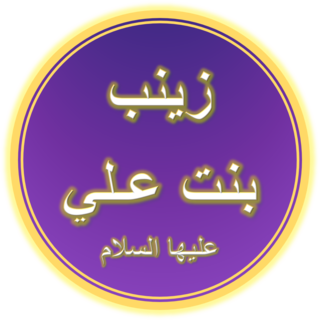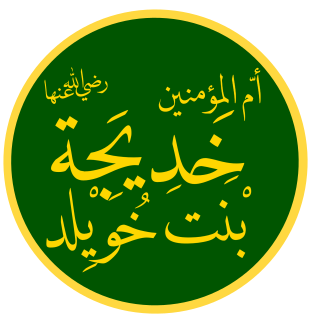Shams ad-Dīn adh-Dhahabī, also known as Shams ad-Dīn Abū ʿAbdillāh Muḥammad ibn Aḥmad ibn ʿUthmān ibn Qāymāẓ ibn ʿAbdillāh at-Turkumānī al-Fāriqī ad-Dimashqī was a Syrian Islamic historian and Hadith expert.

Zaynab al-Sughra, also known by her kunya Umm Kulthum bint Ali, was the granddaughter of the Islamic prophet Muhammad and the daughter of Ali. Whether or not she married Umar is a controversial topic between Sunnis and Shia. She is given the epithet 'the Younger' to distinguish her from her older sister, Zaynab the Elder.

Zaynab bint Ali, also spelled Zainab, was the daughter of Ali ibn Abi Talib and Fatimah bint Muhammad. The Islamic Prophet Muhammad was her maternal grandfather, and thus she is a member of his Ahl al-Bayt. She is often revered not only for her characteristics and actions, but also for her membership in, and continuation of, the biological line of Muhammad. Like other members of her family, she is considered to be a figure of sacrifice, strength, and piety in both the Sunni and Shia sects of Islam.
Moroccan literature is the literature produced by people who lived in or were culturally connected to Morocco and the historical states that have existed partially or entirely within the geographical area that is now Morocco. Apart from the various forms of oral literature, the written literature of Morocco encompasses various genres, including poetry, prose, theater, and nonfiction like religious literature, and was written in the different languages spoken in Morocco throughout history: Amazigh languages, Darija, Arabic, Hebrew, Latin, French, Spanish, or English. Through translations into English and other languages, Moroccan literature originally written in Arabic or one of the other native languages has become accessible to readers worldwide.

Mohammed Bennis in Arabic محمد بنيس is a Moroccan poet and one of the most prominent writers of modern Arabic poetry. Since the 1970s, he has enjoyed a particular status within Arab culture. Muhsin J al-Musawi states that "Bennis’ articulations tend to validate his poetry in the first place, to encapsulate the overlapping and contestation of genres in a dialectic, that takes into account power politics whose tropes are special. As a discursive threshold between Arab East and the Moroccan West, tradition and modernity, and also a site of contestation and configuration, Muhammad Bennis' self-justifications may reveal another poetic predilection, too."
Shihab al-Din abu l-‘Abbas Ahmad ibn Mohammed ibn Mohammed ibn Ahmed ibn Ali ibn 'Abd ar-Rahman ibn Abi'l-'Afiyya al-Miknasi az-Zanati, known simply as Ahmad ibn al-Qadi or Ibn al-Qadi (1552/1553–1616), was a Moroccan polygraph. He was the leading writer from Ahmad al-Mansur's court in Morocco next to Abd al-Aziz al-Fishtali. He was also a renowned judge and mathematician.
Abu al-Qasim az-Zayyani or, in full, Abu al-Qasim ibn Ahmad ibn Ali ibn Ibrahim az-Zayyani (1734/35–1833) was a Moroccan historian, geographer, poet and statesman from the Berber zayane tribe in Morocco. He undertook diplomatic missions to the Ottoman court and engineered government attempts to bring tribes under central authority. His writings include several historical accounts of the Ottoman and Alaouite dynasties. Az-Zayyani wrote fifteen works in the field of history and geography. Some authors even consider him the greatest historian of Morocco.
Abu Ali al-Hassan ibn Masud al-Yusi (1631–1691) was a Moroccan Sufi writer. He is considered to be the greatest Moroccan scholar of the seventeenth century and was a close associate of the first Alaouite sultan Rashid. Al-Yusi was born in a Berber tribe, the Ait Yusi, just north of Fes. He was married to Zahra bint Muhammad b. Musa al-Fasi. Al-Yusi left his native village on a very young age for a lifelong pilgrimage. He received his barakah from Sheikh Mohammed Ben Nasir of the tariqa Nasiriyya of Tamegroute, and studied and taught at the zawiyya of Dila with Mohammed al-Hajj ibn Abu Bakr al-Dila'i.
Bashir Qamari is a well known Moroccan literary critic, novelist and playwright.

Abdelkrim Ghallab was a Moroccan political journalist, cultural commentator, and novelist. He is an important figure both in the literary and political field.
Ahmed al-Tayyeb Aldj is a well known Moroccan writer of poetry and drama.

Abdellah Guennoun was a famous and influential Moroccan writer, historian, essayist, poet, academic, administrator, journalist, and faqīh. He was one of the leaders of the Nahda movement in Morocco, and served as the general secretary of the League of Moroccan Religious Scholars.
Abdelkarim Tabbal is a Moroccan poet.
Thouria Saqqat was a Moroccan writer of children's books. She worked as a teacher in Casablanca.

Khadijah bint Khuwaylid, commonly known as Khadija, was the first wife and first follower of the Islamic prophet Muhammad. Khadijah was the daughter of Khuwaylid ibn Asad, a leader of Quraysh tribe in Mecca, and a successful businesswoman in her own right.

Charbel Dagher is a Lebanese professor at the University of Balamand, Koura, Lebanon. He has been an active and prominent voice on the Arab cultural scene, mainly in the fields of poetry, Arabic language, and Arab and Islamic arts. He is a Poet, writer and story-writer in both Arabic and French.
Abū Naṣr Tāj al-Dīn ʻAbd al-Wahhāb ibn ʿAlī ibn ʻAbd al-Kafi al-Subkī, or Tāj al-Dīn al-Subkī – or simply Ibn al-Subki – was a leading Islamic scholar, a faqīh, a muḥaddith and a historian from the celebrated al-Subkī family of Shāfiʿī ʿulamā, during the Mamluk era.

Ali Oumlil is a Moroccan philosopher, thinker, human rights activist, diplomat and political persona.







